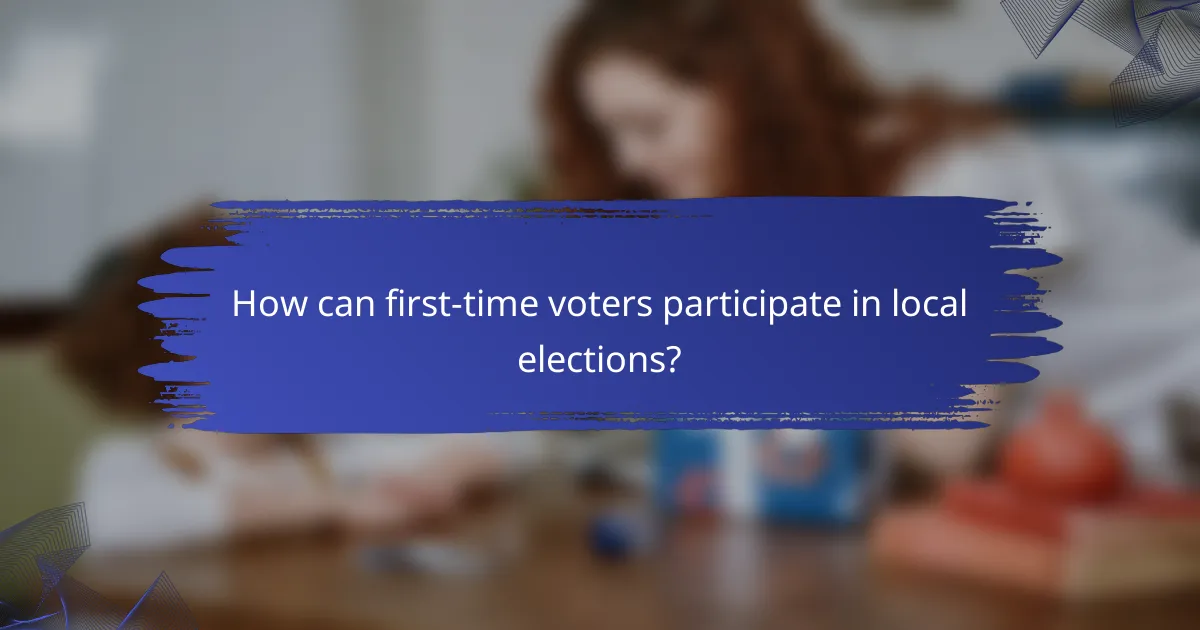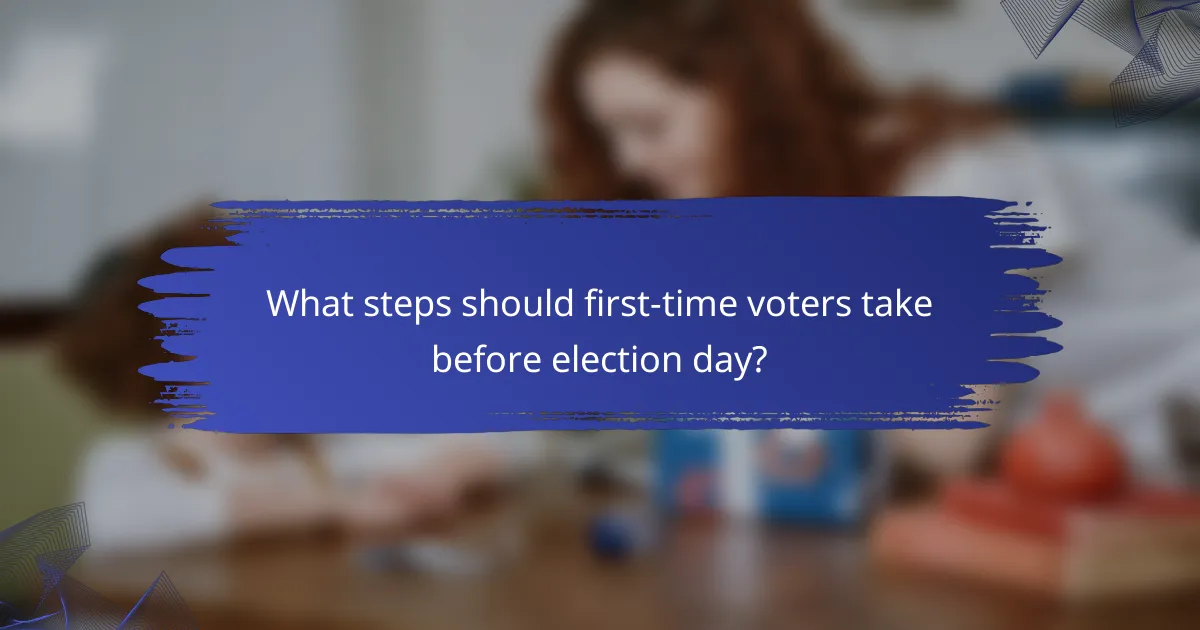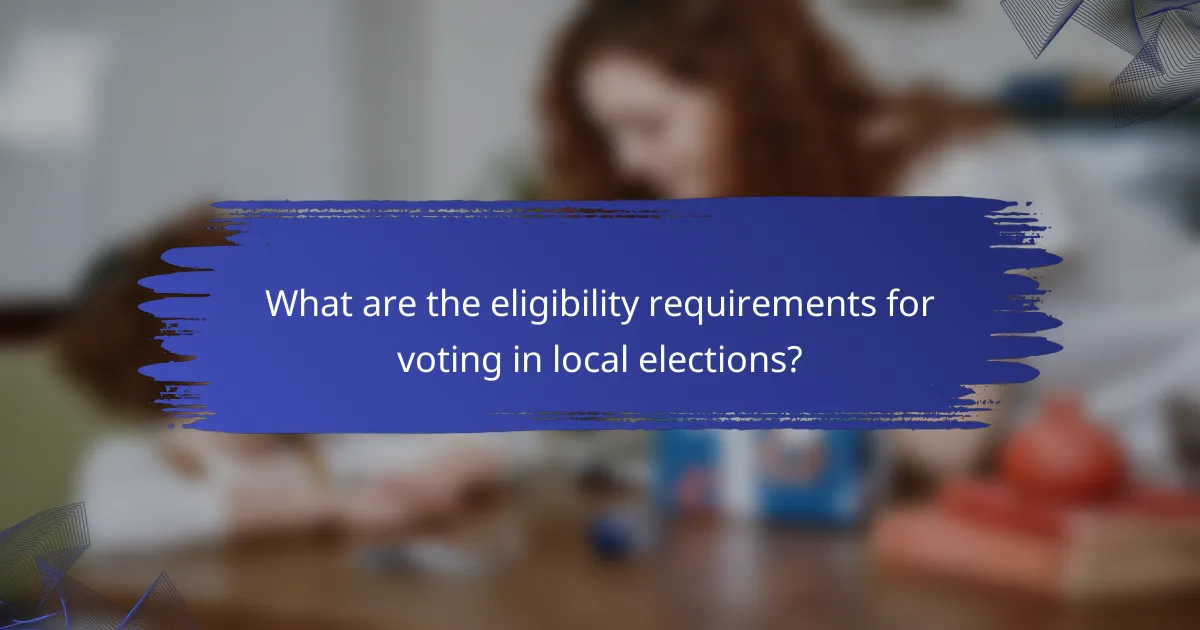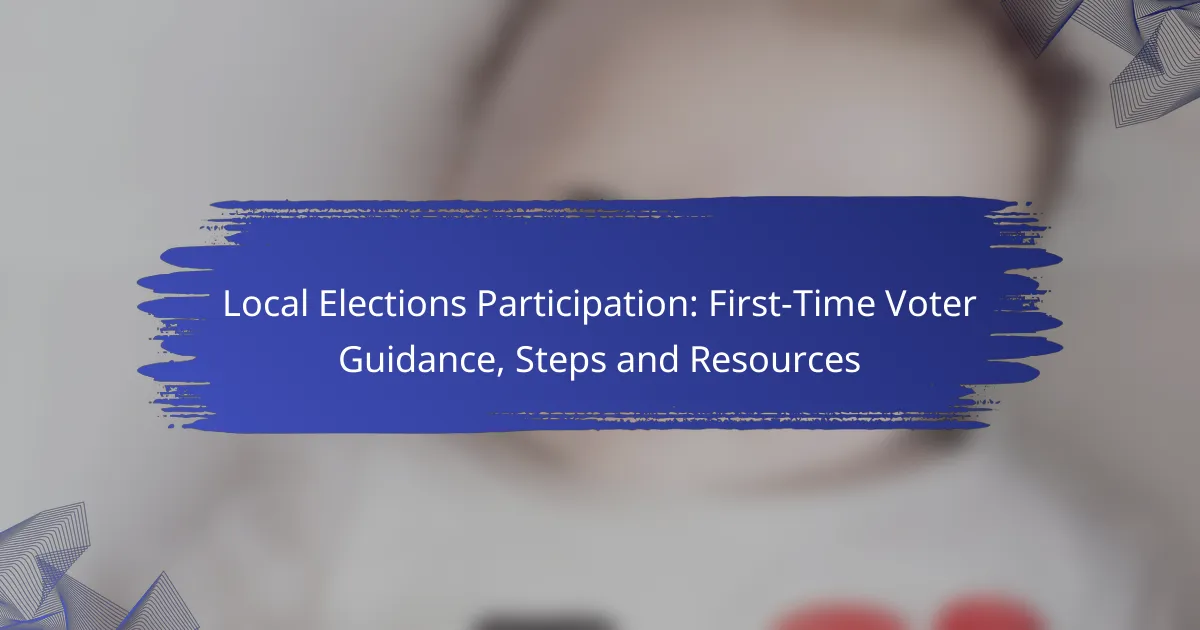Participating in local elections for the first time can be an empowering experience. To ensure your voice is heard, it’s important to register to vote, understand the voting process, and familiarize yourself with local candidates and measures. Accessing available resources will help you navigate these steps effectively and prepare for election day.

How can first-time voters participate in local elections?
First-time voters can participate in local elections by registering to vote, casting their ballots early or by mail, and engaging in local outreach events. Understanding these steps will help ensure that new voters can effectively make their voices heard in the electoral process.
Register to vote online
Registering to vote online is a convenient option for first-time voters. Most states offer online registration, allowing you to complete the process in just a few minutes. Check your state’s election office website for specific deadlines and requirements.
When registering, be prepared to provide personal information such as your name, address, and date of birth. Some states may also require a driver’s license number or Social Security number. Ensure that all information is accurate to avoid any issues on election day.
Vote early at designated locations
Voting early is a great way to avoid long lines and ensure your participation in local elections. Many jurisdictions offer early voting at designated locations, typically starting a few weeks before election day. Check your local election office for specific dates and locations.
When voting early, bring a valid form of identification if required by your state. This could include a driver’s license, state ID, or another accepted form of ID. Early voting hours may vary, so confirm the times to plan your visit accordingly.
Vote by mail options
Voting by mail provides flexibility for first-time voters who may not be able to vote in person. Most states allow voters to request a mail-in ballot, which can be completed at home and returned by mail or dropped off at designated locations. Be aware of the deadlines for requesting and returning mail-in ballots.
When voting by mail, ensure you follow all instructions carefully, including signing the envelope if required. It’s advisable to send your ballot back as early as possible to avoid any postal delays that could prevent it from being counted.
Participate in local voter outreach events
Engaging in local voter outreach events can enhance your understanding of the electoral process and connect you with other voters. Many organizations host events to educate first-time voters about their rights and the voting process. Look for events in your community, such as workshops or informational sessions.
These events often provide valuable resources, including how to register, vote, and understand local issues on the ballot. Participating can also help you feel more confident and informed when casting your vote.

What steps should first-time voters take before election day?
First-time voters should take several key steps to ensure they are prepared for election day. This includes checking their voter registration status, researching local candidates and measures, and learning about polling places.
Check voter registration status
Verifying your voter registration status is crucial to ensure you can vote. You can typically check this online through your state’s election office website. Make sure to do this well in advance of election day to address any issues that may arise.
If you find that you are not registered, most states allow you to register online, by mail, or in person. Be mindful of registration deadlines, which can vary by state, often closing a few weeks before the election.
Research local candidates and measures
Understanding who and what you are voting for is essential. Research local candidates by reviewing their platforms, past performance, and any debates or forums they participate in. Many local news outlets and civic organizations provide non-partisan information to help you make informed choices.
Additionally, familiarize yourself with any local measures or propositions on the ballot. These can significantly impact your community, so take the time to read summaries and analyses to understand their implications.
Learn about polling places
Knowing where to vote is vital for first-time voters. Polling places can vary based on your registered address, so check your local election office for the correct location. Many states provide this information online, and it’s advisable to confirm it a few days before the election.
Plan your visit to the polling place, considering factors like peak voting times and transportation options. If you are voting during busy hours, be prepared for potential wait times. Make sure to bring any required identification, as some states have specific ID laws for voters.

What resources are available for first-time voters in the United States?
First-time voters in the United States can access various resources to help them navigate the voting process. These resources provide essential information on registration, candidates, and local election procedures, ensuring a smooth voting experience.
Vote.org for registration and information
Vote.org is a comprehensive platform that assists individuals with voter registration and provides crucial information about upcoming elections. Users can check their registration status, find deadlines, and learn about voting methods in their state.
To get started, simply visit the Vote.org website, enter your state, and follow the prompts to register online or by mail. Remember to check your state’s specific deadlines, as they can vary significantly.
League of Women Voters for candidate guides
The League of Women Voters offers nonpartisan candidate guides that help voters make informed decisions. These guides typically include candidate biographies, positions on key issues, and other relevant information.
Access these guides by visiting the League of Women Voters’ website and selecting your state. This resource is particularly useful for understanding local candidates and ballot measures, making it easier to prepare for your vote.
Local election office websites
Your local election office website is a vital resource for specific information regarding your area’s voting process. These sites provide details on polling locations, early voting options, and any local regulations that may apply.
To find your local election office, search online with your state and county name. Familiarize yourself with the site, as it may also offer contact information for any questions you might have leading up to the election.

What are the eligibility requirements for voting in local elections?
To vote in local elections, you must meet specific eligibility criteria, which generally include age, citizenship, and residency. Each state has its own rules, so it’s essential to check local regulations to ensure you qualify.
Age requirements vary by state
Most states require voters to be at least 18 years old on or before election day. However, some states allow individuals who are 17 years old to vote in primaries if they will turn 18 by the general election. Always verify your state’s specific age requirements before registering.
In a few cases, local jurisdictions may have different rules, so check with your local election office for any exceptions or additional guidelines.
Citizenship status must be verified
Only U.S. citizens can vote in local elections. When registering, you may need to provide proof of citizenship, which can include a birth certificate, passport, or naturalization documents. Each state has its own process for verifying citizenship, so consult your local election authority for details.
Be aware that some states have stricter laws regarding citizenship verification, which may require additional documentation. Ensure you have the necessary paperwork ready when you register.
Residency requirements apply
To vote in a local election, you must be a resident of the state and often the specific locality where you intend to vote. Residency requirements can vary significantly, with some states requiring you to live in the area for a certain period before the election.
Check your state’s residency rules, as they may specify a minimum duration of residence, which can range from a few weeks to several months. Make sure to register at your current address to avoid any issues on election day.

How do local elections differ from federal elections?
Local elections focus on community-specific issues and governance, while federal elections address national policies and representatives. The procedures, issues on the ballot, and the impact of these elections can vary significantly, making it essential for voters to understand these differences.
Different voting procedures
Voting procedures for local elections can differ from those used in federal elections. For instance, some local jurisdictions may allow early voting or mail-in ballots, while others might require in-person voting on Election Day. It’s crucial to check your local election office’s guidelines to understand what identification you may need and the methods available for casting your vote.
Additionally, local elections may have different registration deadlines and requirements. Some areas allow same-day registration, which can be beneficial for first-time voters. Always verify the specific rules in your locality to ensure a smooth voting experience.
Varied local issues on the ballot
Local elections often feature issues that directly affect your community, such as school funding, public transportation, and local law enforcement policies. These topics can significantly influence daily life, making it important for voters to be informed about the candidates and measures on the ballot.
For example, a local election might include propositions for new parks or changes to zoning laws. Understanding these issues can help you make informed choices that align with your community’s needs and values.
Impact on community governance
Local elections play a crucial role in shaping community governance and decision-making. Elected officials at the local level, such as mayors and city council members, have the power to implement policies that affect public services, infrastructure, and community development.
Engaging in local elections can lead to more responsive governance, as these officials are closer to the constituents they serve. Voting in these elections allows you to influence the direction of your community and advocate for issues that matter to you and your neighbors.










